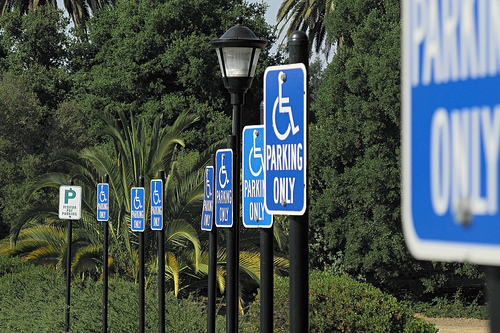


PBS senior correspondent Judy Woodruff has been a longtime advocate for people with disabilities. Back in February, we brought attention to her PBS NewsHour segment with Rachel Simon, author of the bestselling novel, The Story of Beautiful Girl. Last week, she ventured onto the PBS.org Rundown blog to post “Two Hopeful Signs for Americans with Disabilities,” on the same day that the new Americans with Disabilities Act standards governing architectural barriers went into effect.
Given her experience covering the highest levels of government, it’s no surprise that Woodruff was already aware of a bill introduced on the Senate floor intended to exempt swimming pools from complying with the updated regulations. She referenced the same USA TODAY article we noted Monday, where Barbara De Lollis spoke with hospitality industry lobbyists about the confusion over whether the Justice Department considered temporary lifts a “readily achievable” measure that satisfied the new Title II and III requirements.
Woodruff also took the time to engage with her commenters, some of whom shared stories about their own experience as a person with a disability navigating an inaccessible landscape. A poster identified as “PCH45” recalled a similar circumstance following passage of the 1973 Rehabilitation Act:
… [O]ne of the early attempts to improve access to federal buildings exempted the Post Office because of the efforts of politicians. Now remember this was before the days of email or even faxes. One federal building you needed to get in was a post office!
Since opposition to making swimming pools fully accessible stems in part from ambiguity surrounding the phrase “readily achievable,” Woodruff asks readers for their opinions as to whether all recreational activities should be held to the same standard of accessibility, or is accommodation more reasonable for some activities than others, and how is that determined?
The two direct responses to Woodruff’s inquiry could be placed on nearly opposite ends of a continuum. Donald Miller, who mentions that he receives funds from disability insurance, empathizes with the cost concerns; saying if the only options were an inaccessible amenity — like a swimming pool — or no amenity at all, he would prefer that people without disabilities still have the chance to use it even if he could not.
Larry Woller, on the other hand, takes the opportunity presented by Woodruff’s question to point out that the goal of making recreational amenities and activities accessible to all is to give them the same opportunities to challenge themselves on their own terms:
… [I]t is the attempt that is important… I have witnessed disabled people who took hours to finish a marathon that only lasted a couple of hours for those that were not disabled… but finish they did, a personal goal set for themselves.
How much does accessibility to recreational opportunities contribute to making life matter for you? Share your thoughts in the comments section.
Image by John Loo, used under its Creative Commons license.